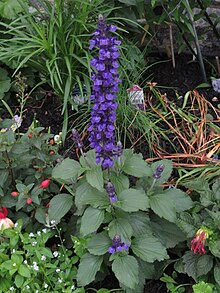| Salvia longispicata | |
|---|---|

| |
| Scientific classification | |
| Kingdom: | Plantae |
| Clade: | Tracheophytes |
| Clade: | Angiosperms |
| Clade: | Eudicots |
| Clade: | Asterids |
| Order: | Lamiales |
| Family: | Lamiaceae |
| Genus: | Salvia |
| Species: | S. longispicata |
| Binomial name | |
| Salvia longispicata M.Martens & Galeotti | |
Salvia longispicata is a perennial shrub native to southwestern Mexico, growing between 1,000 and 6,500 feet (300 and 2,000 m) elevation. The specific epithet "longispicata" gives the impression that the plant has "long spikes", but instead refers to the many projecting clusters of short flowering spikes that resemble small ears of corn.
Salvia longispicata is a large, fast growing Salvia, reaching 4 to 5 feet (1.2 to 1.5 m) high and 3 to 4 feet (0.9 to 1.2 m) wide in one season. While not particularly showy, it has unusual dark purple flowers and an upright habit—both qualities are valued by salvia hybridizers. The mid-green ovate leaves are many sizes, and connected to the petiole at the broader end. Small - less than 0.5 inches (1 cm) - dark purple flowers begin appearing in summer and bloom into late autumn. The pale green calyces are about the same length as the flower. The 6 to 8 inches (15 to 20 cm) inflorescences have tight whorls of flowers, which do not rise above the foliage as many other species of Salvia do.

In 1979 a spontaneous sterile hybrid was found at Huntington Library that was believed to be from a cross between Salvia longispicata and S. farinacea. It was introduced as the highly popular Salvia farinacea × longispicata 'Indigo Spires'. Other cultivars of this hybrid include 'Mystic Spires Blue'.
References
- "Salvia longispicata". Germplasm Resources Information Network. Agricultural Research Service, United States Department of Agriculture. Retrieved 2013-07-22.
- ^ Clebsch, Betsy; Barner, Carol D. (2003). The New Book of Salvias. Timber Press. p. 178. ISBN 978-0-88192-560-9.
- "Mystic Spires Blue Salvia". Texas Superstar. Retrieved 2013-07-22.
| Taxon identifiers | |
|---|---|
| Salvia longispicata | |
This Salvia article is a stub. You can help Misplaced Pages by expanding it. |